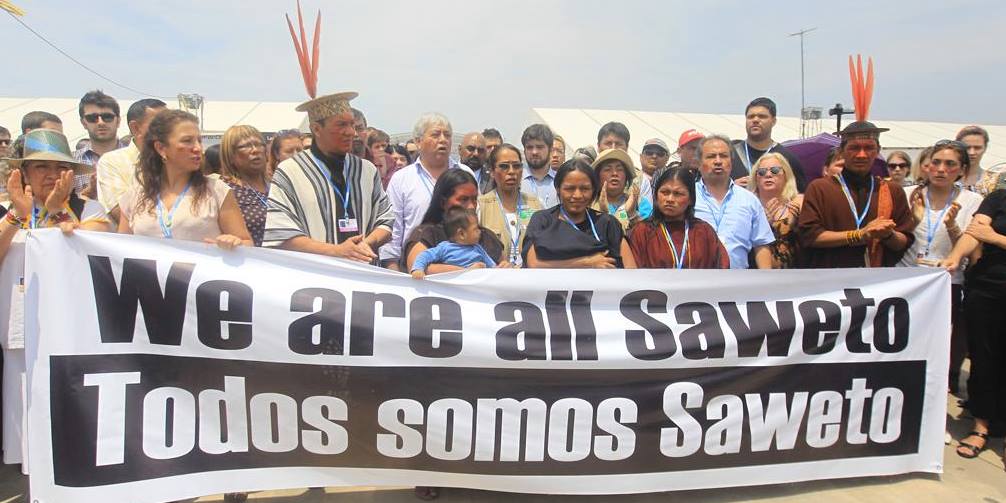As we write this, communities across the islands in central Philippines are reeling after Typhoon Hagupit hit land on Saturday night. It’s almost exactly a year after record-breaking Typhoon Haiyan burst through the same area, demolishing a million homes and killing more than 7,000 people, and almost two years to the day since Super Typhoon Bopha touched down leaving over 1 million families displaced and over 1,000 people dead. The CYD wrote a solidarity statement with the Philippines at COP 18. At the time of writing this, Typhoon Hagupit has already caused over one million people to evacuate their homes, and three fatalities have been confirmed.
Here in Lima, both the IPCC and World Meteorological Organization have once again pointed to research showing that climate change drives the increased strength of tropical storms like Hagupit, Haiyan, and Bopha. In other words, the rampant oil and gas extraction and expansion happening around the globe is directly affecting the safety of coastal communities. With direct links between industrial extraction and the risk of extreme weather events, famine, water scarcity and conflict clearly spelled out, this energy development path is not just short-sighted, it’s immoral.
We have also seen stark reminders this week that governments are not protecting the people who stand up against polluters. The families of four Ashéninka leaders who were killed for defending their home in the Peruvian Amazon travelled to the COP20 conference to demand justice. In the wake of this tragedy the Peruvian government has failed to protect activists’ families, convict their killers, or hold up the land rights they died fighting for. There’s a striking incompatibility to the fact that Peru is hosting UN global climate talks to foster environmental progress when just this summer, they legalized police repression against protesters, effectively giving police a license to kill people for defending their access to a safe environment. But Peru is not alone, far from it.
Frontline resistance of corporate interest is being met with violence across the globe. In neighbouring Ecuador, the body of indigenous leader José Isidro Tendetza Antún, who has been missing since November 28, was found this week. Antún was an outspoken critic of an open-cast pit and other extractive projects in his peoples’ territory. The pit-mine was originally owned by Canadian company Ecuacorriente, which was sold to a Chinese conglomerate in 2010. Over 50 per cent of the world’s publicly listed mining companies are headquartered in Canada, so the direct linkages between our home on native land and the injustices around the world are clear.
In Canada, First Nations, Inuit, and Metis peoples are disproportionately affected by the extraction industry. Around the globe, indigenous and racialized people and those living in poverty are undoubtedly bearing the brunt of the effects of climate change. In spite of this or perhaps because of it, they are fighting back, and some are paying for it with their lives. We want to take time to acknowledge the frontline communities around the world that are standing up for their right to a safe environment for themselves, their families, and their future.
The people most impacted should be the people making the decisions. Instead, governments and their corporate cronies are pillaging the earth, displacing communities, decimating ways of life, raking in billions of dollars and then dragging their feet at the policy level — this is unacceptable. We must stand behind the communities that are facing the effects of climate change and unconstrained resource extraction, and stand up to our governments that are allowing it. As Filipino activist Jasper Inventor said on Sunday morning, “In the hour of our peril, now is the time for politicians to back up their expressions of solidarity with real action at the UN climate talks — It has become an issue of our survival.”
Honour the treaties, protect Indigenous rights, justice for the missing and murdered.




